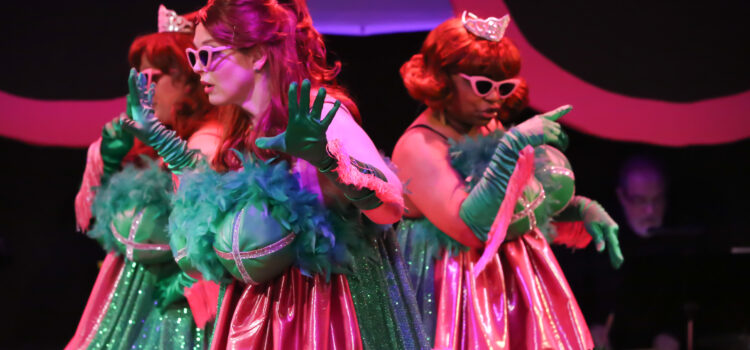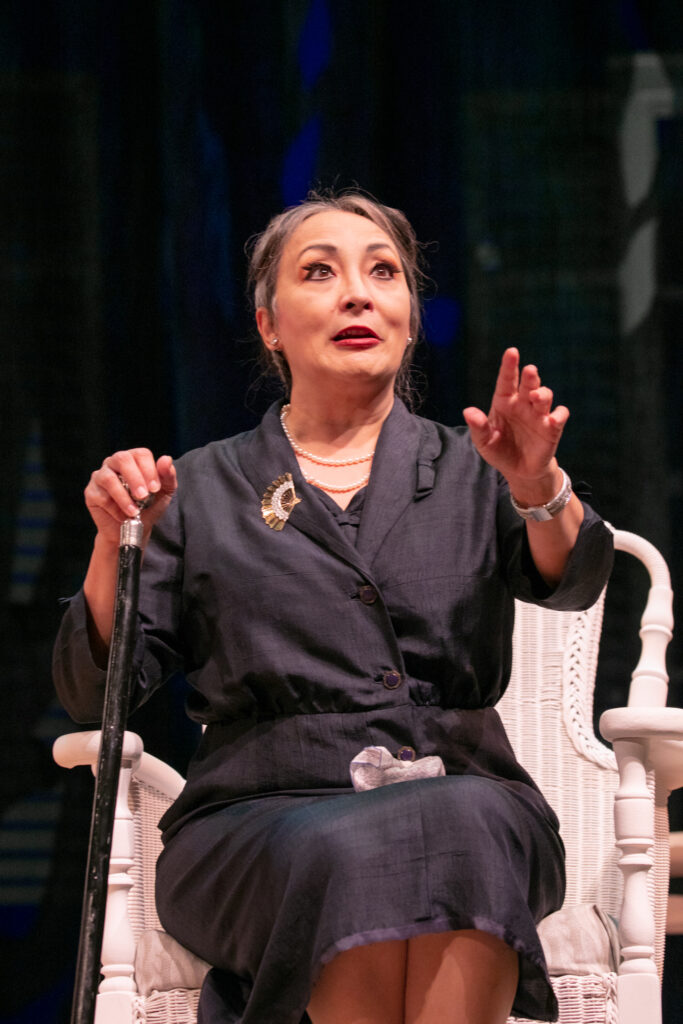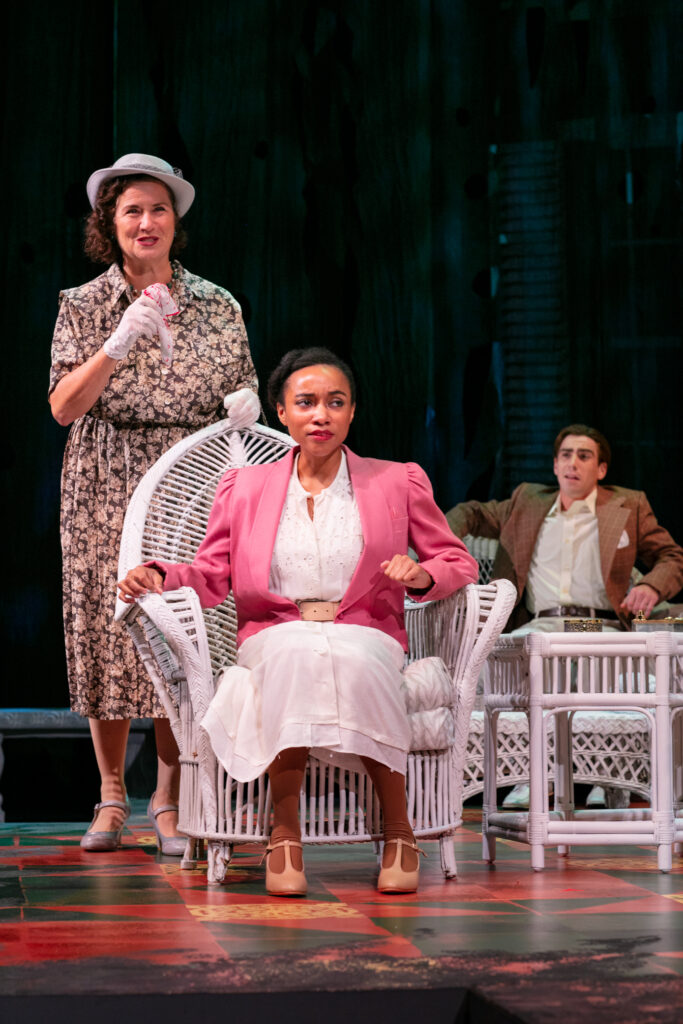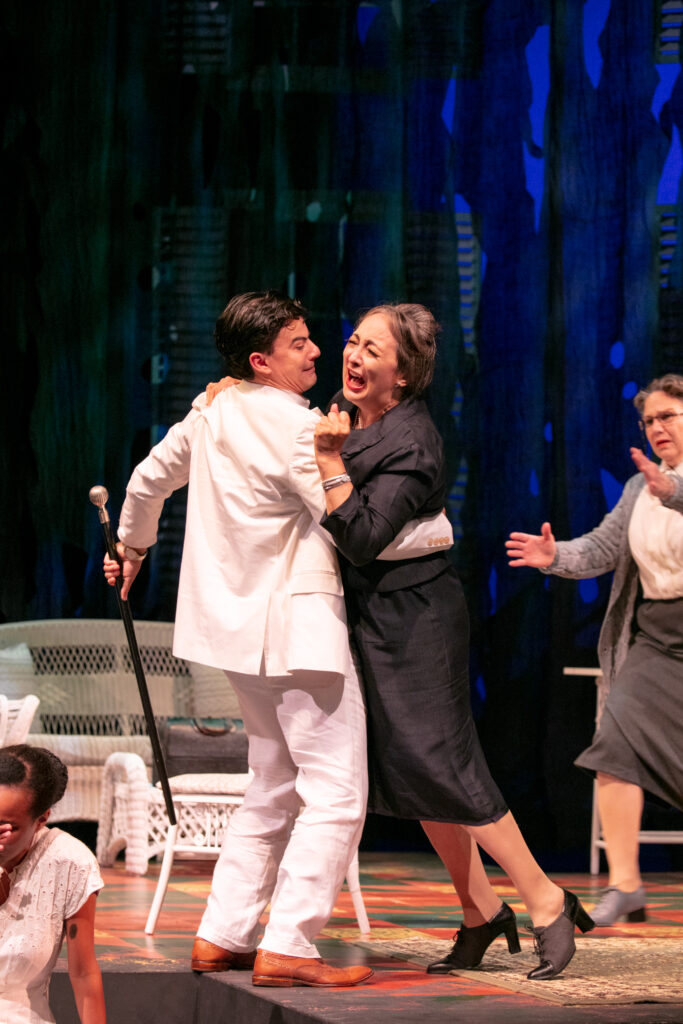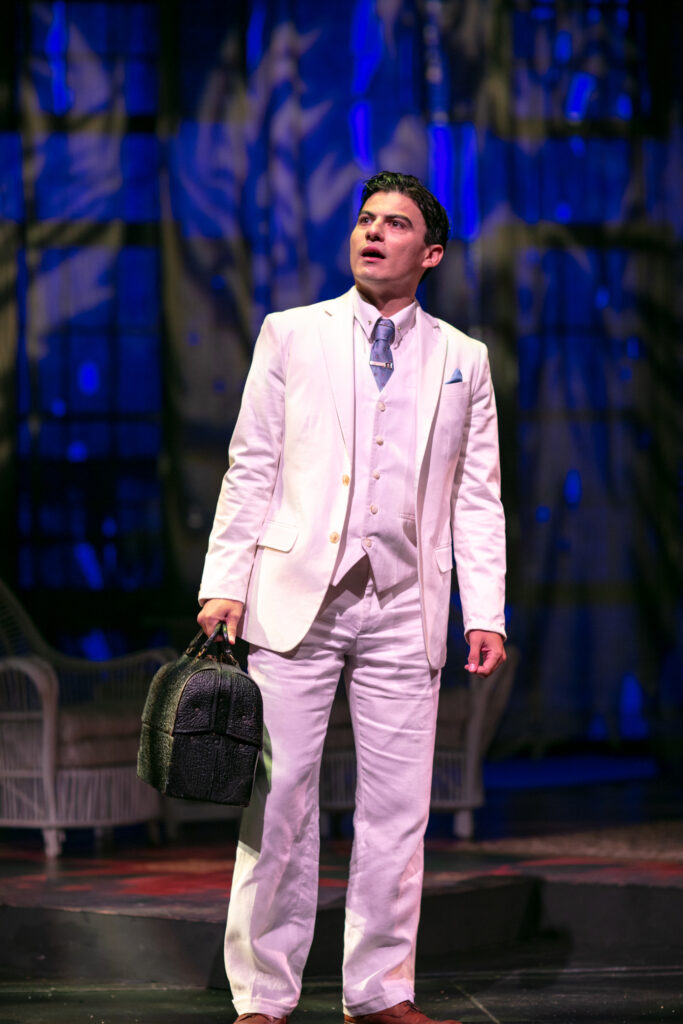By Lynn Venhaus
A sweet-and-salty nutty mixed bag of brash gal pals and scummy exes who didn’t deserve them, “Sweet Potato Queens” sets a table for women to be proud and live out loud, no matter their lot in life.
With the exalted Boss Queen in the house, and members of the audience adorned with tiaras, sequins and neon pink feather boas, a spirited crowd – including the real inspirations behind some of the colorful characters – was in a feisty Saturday night mood to partake in the sassy and saucy Southern rock musical, “Sweet Potato Queens.”
If you are unfamiliar with the SPQ national movement, founder Jill Conner Browne and her closest friends in Jackson, Miss., have been empowering women since 1982. A New York Times’ bestselling author, she has spawned 6,200 registered Sweet Potato Queens chapters in 37 countries around the world.
New Line Theatre is producing the musical’s regional premiere, which is attracting appearances by Sweet Potato Queens and the creative people behind the musical, which debuted in 2016 in Houston and so far, has only been performed four other times.
The plucky material blends Southern prototype ‘girl power’ settings like “Designing Women” and “Mama’s Family,” and pink-collar components to “Steel Magnolias,” “Sex and the City,” and “The Divine Secrets of the Ya-Ya Sisterhood” for a frothy ‘you go, girl’ energy shot.
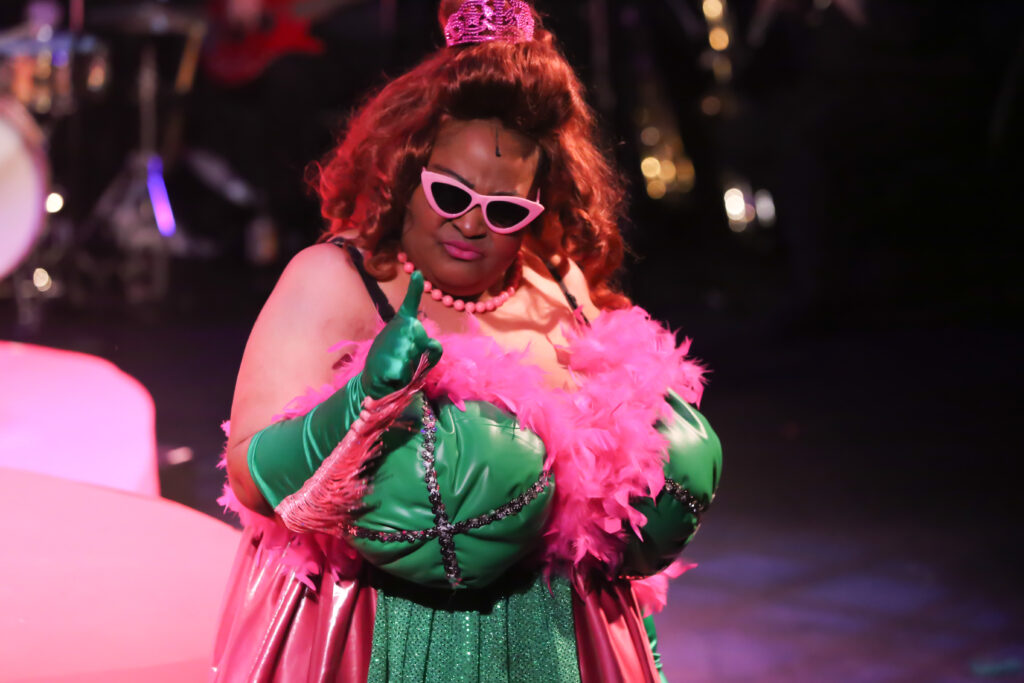
These are belles without a cotillion, no sorority sisters in sight, but they’ve bonded in silly and sublime ways, thanks to going through some things. Directors Scott Miller and Tony L. Marr Jr. make a point to bring out the humanity amid a carnival environs.
On March 9, the regal Browne and her entourage made grand entrances in sparkly outfits at The Marcelle, and upon introduction before the show, she regaled the crowd with the origins of her girls’ group in a very funny warm welcome. Their first appearance in a St. Patrick’s Day parade is a hoot (Google it!).
A woman who grabs life with gusto and lives by the tagline, “Be Particular,” Browne is the author of nine books, starting with “Sweet Potato Queens’ Book of Love” in 1999, then “God Save the Sweet Potato Queens” in 2001, followed by “The Sweet Potato Queens’ Big-Ass Cookbook and Financial Planner” in 2003, and including “Sweet Potato Queens’ Field Guide to Men: Every Man I Love Is Either Married, Gay, or Dead” in 2004, “The Sweet Potato Queens’ Guide to Raising Children for Fun and Profit” in 2008, and “Fat is the New 30: The Sweet Potato Queens’ Guide to Coping with (the crappy parts of) Life” in 2012.
While many fans are primarily middle-aged and middle-class women, many chapters have people from all walks of life, and all promote positive thinking and self-esteem. Browne says the SPQ movement is to inspire “all of us to do what makes our hearts sing,” and that’s the opening number of the show.
While the uninitiated may think the spotlighted women fall into Southern stereotypes, it is wise not to go there, for do not underestimate their wit, smarts, and resilience. These are not tsk-tsk yokels from another branch of the family tree or plucked fresh from the cabbage patch to be laughed at – you will laugh with them because they find out who they are and are OK with that.

Brown refers to her first husband as the anti-Christ, and if he’s anything resembling Jeffrey M. Wright’s woeful dirtbag Tyler, whoa.
Wright is such a polished, likeable performer that at first, it’s hard to adjust accepting him as a sleazeball, but he oozes unctuousness in his ladies-man encounters and is slick as this low-life liar that’s not smart enough to be convincing in his ruses (and he has a couple dandy ones). Yes, it’s called acting, and he showed his range.
Meanwhile, his long-suffering wife, Jill Conner Browne, played by good-natured Talichia Noah, is at her wit’s end, and finally musters enough dignity and self-determination to break free from the ‘stand by your man’ mantra.
She does so as part of a playful quartet with her three lively BFFS, all named Tammy. Of course! They introduce themselves in the cheeky “It’s Me” and spunky “SPQ-tiful,” and give Jill advice in the ballad “Make a Wish.”
A consummate pro, Ann Hier Brown is a revelation as firecracker “Too Much Tammy,” with heaping helpings of street smarts and in-your-face bravado. She dives into the amusing second act opener “Funeral Food” with abundant zest.
Another veteran, Mara Bollini, sashays with attitude as Floozie Tammy, uninhibited in “One Last Kiss” and spills the sweet tea on her sexual escapades. Brown, Bollini and Noah are a force on “The Only Thing I Know.”

Victoria Pines completes the Tammy trio, as Flower Tammy, an abused wife who leans on her friends about her predicament. She displays her terrific vocal skills in the poignant ballad “Cherries in the Snow.”
The show’s standout this performance was Aarin Kamphoefner as George, going beyond the cliches as a beacon of hard-fought self-acceptance, and a caring friend to the girls – no judgment, just reassurance.
He has fun leading “Mad Dog Twenty-Twenty” as a good time song. Comfortable in his skin as a queer in the deep South, George, a good listener, has something to say, and Kamphoefner shines, tugging at our heartstrings reprising “It’s Me.”
Performing on March 9, while the real “TammyGeorge” was sitting in the front row, he deserved a standing ovation for pouring his heart out in an emotionally vulnerable solliloquy while a patron’s cell phone was audible and wasn’t immediately turned off. Kamphoefner held composure and drew everyone into his character’s truth. Bravo!
Portraying the concerned parents dispensing homespun wisdom are Bethany Barr as Mama and Kent Coffel as Daddy. Coffel also has a couple different minor roles, and always shows his versatility as a local MVP. He kindheartedly reprises “Do What Makes Your Heart Sing” several times.
The music is composed by Melissa Manchester, a longtime singer, songwriter and actress, who has been active since the 1970s. She first came to prominence as one of Bette Midler’s back-up singers, “The Harlettes.”
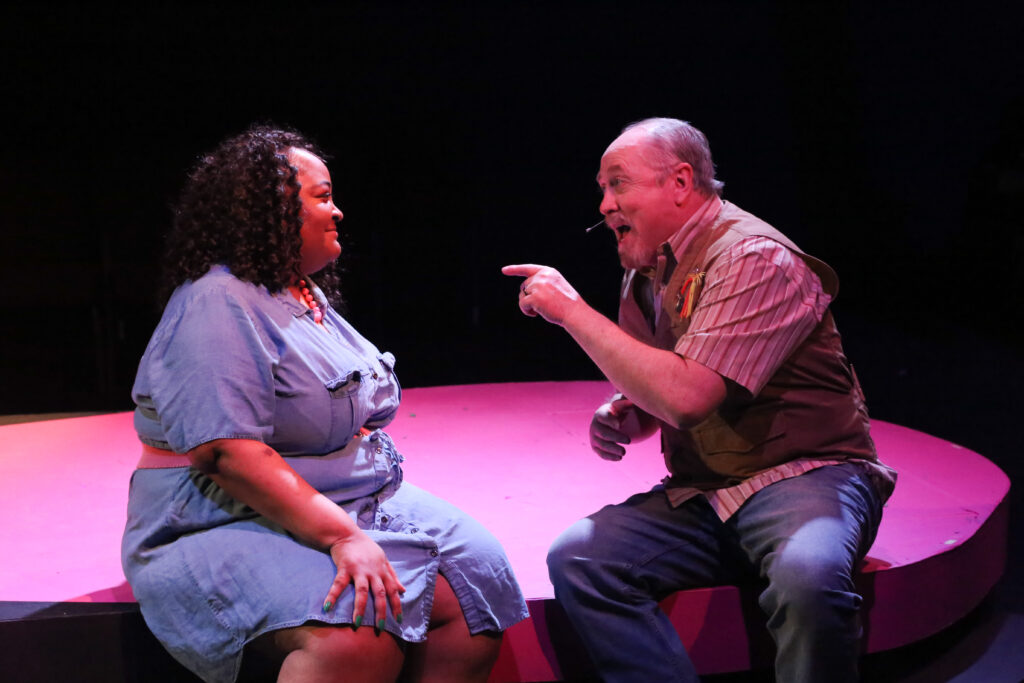
Some of her career highlights include her first smash hit “Midnight Blue” (recently a music video duet with Dolly Parton!), her Grammy-nominated performance of Peter Allen’s “Don’t Cry Out Loud,” and co-writer with Kenny Loggins on his collaboration with Stevie Nicks “Whenever I Call You Friend.” She won a Grammy in 1983 for “You Should Hear How She Talks About You.”
As an actress, she played Maddy Russo on the TV show “Blossom” 1993-95, and last year played Mrs. Brice on the first national tour of “Funny Girl.”
Fun fact: Her solo 1984 concert at the Fabulous Fox Theatre here was my first review assignment from a St Louis Globe-Democrat editor.
Lyrics are by country songwriter Sharon Vaughn, who has penned hits for Randy Travis, Reba McEntire, Patty Loveless, Kenny Rogers and others. Her big breakthrough in 1976 was with the Waylon Jennings hit “My Heroes Have Always Been Cowboys,” which Willie Nelson covered for the 1979 Robert Redford movie “The Electric Horseman.” She was inducted into the Nashville Songwriters Hall of Fame in 2018.
With two women writing the female-forward songs, the numbers flavor the characters’ arc with a range of earnest emotions, what the characters are feeling at the time. The music has a peppy ‘60s girl-group vibe, with a splash of the self-acceptance of Tracy Turnblad in “Hairspray” and the boldness to be who you are of “Kinky Boots.”
“Five” is a showstopper, detailing Brown’s list for five men you must have in your life at all times: 1. Someone who can fix things 2. Someone you can dance with 3. Someone you can talk to 4. Someone who can pay for things (so you’re not paying their share) and 5. Someone to have great sex with. That about covers it, wouldn’t you say?
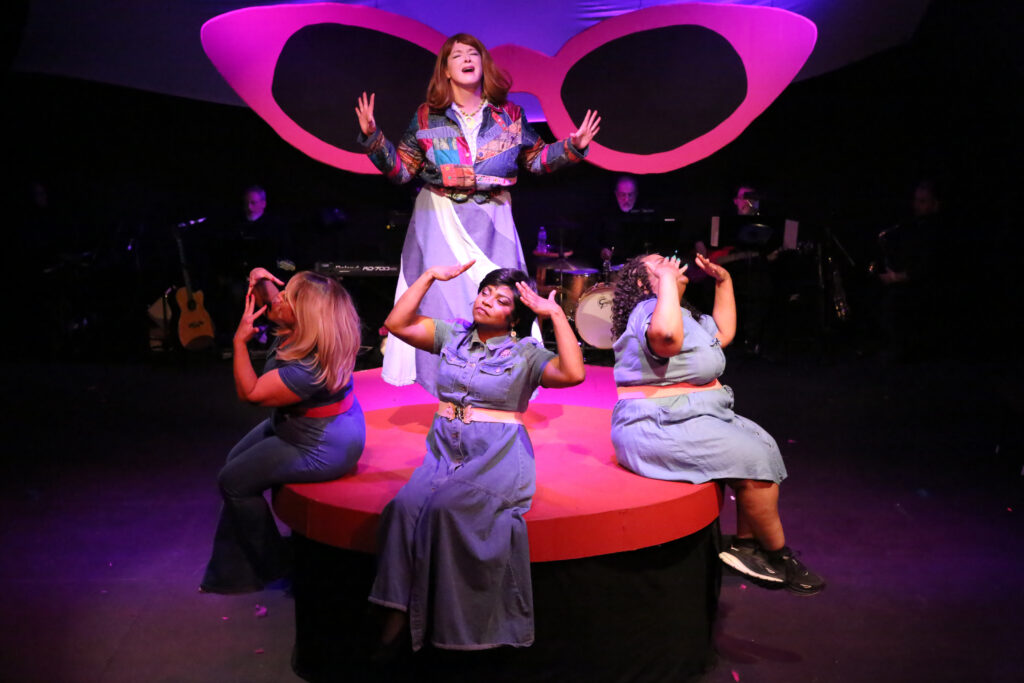
The band is tight, with seasoned New Line regulars John Gerdes on electric bass, Clancy Newell on percussion and Adam Rugo on electric guitar, and they are joined by Brandon Thompson on reeds, Nikki Ervin on keyboard, and conductor Dr. Tim Amukele on keyboard as well.
The enormity of the vocal load the lead must carry is daunting, as Jill must sing solo: “Do What Makes Your Heart Sing,” “Southern Side of Jackson,” “All That Matters,” and “To Be Queen,” and duos with Mama in “Sears,” Tyler in “We Had Some Good Times,” and the others in ensemble pieces. With that much to sing, Noah struggled at times, and her voice seemed strained because of the role’s demands the farther the show progressed. Perhaps Amukele’s guidance will help on the rough spots. But even for the most accomplished vocalist, that’s a herculean effort.
The book By Rupert Holmes lovingly spotlights the characters for their strength, grace under pressure, and their willingness to be audacious. Holmes won multiple Tony Awards for the book music and lyrics, all solo acknowledgements, for “The Mystery of Edwin Drood.” He’s known for the pop song “Escape (The Pina Colada Song).”
According to press material, “The team continues to work on the show. The St. Louis production will be the fifth production of the show so far.” While entertaining, it does appear to be a work in progress, and the rough-around-the-edges effort is well-meaning and good-hearted, but some tightening up would make it zing.
Rob Lippert’s minimal set design emphasizes the vibrant spirit of the production, with the iconic pink sunglasses as a major focal point. Matt Stuckel and Ryan Day capably handled the lighting and sound.

Zachary Phelps designed the flashy and curvy baby-doll SPQ anthem costumes as well as the everyday attire of the cast. The shiny pink-and-green outfits look like a vamped-up creation crossing “Amazon Women of the Moon” with “Barbarella” and John Waters’ movies.
For anyone who has experienced dreams-deferred, “Sweet Potato Queens” is a reminder to believe in your potential and stay true to your ideals. It does so with an energetic mindset, a desire to spread goodwill, and a celebratory, humorous spirit. After all, real queens adjust each other’s crowns.
Addendum: To follow in the footsteps of other SPQs across the land, Browne recommends Revlon® “Love That Pink” lipstick, flowing red wigs, and majorette boots. They wore green hand-me-down ball gowns and tiaras for their first St. Patrick’s Day Parade, and said when she discovered she lived near Vardaman, Miss., the self-proclaimed Sweet Potato Capital of the World, that was all it took to offer herself as the queen for the farmers’ annual festival.

New Line Theatre presents “Sweet Potato Queens” from Feb. 29 to March 23, Thursdays, Fridays, and Saturdays at 8 p.m. at the Marcelle Theater, 3310 Samuel Shepard Drive.
Tickets are $25 for adults and $20 for students/seniors for the preview; and $30 for adults and $25 for students/seniors for all other performances. To charge tickets by phone, call MetroTix at 314-534-1111 or visit the Fox Theatre box office or the MetroTix website.
For more information about discounts, visit the website: www.newlinetheatre.com

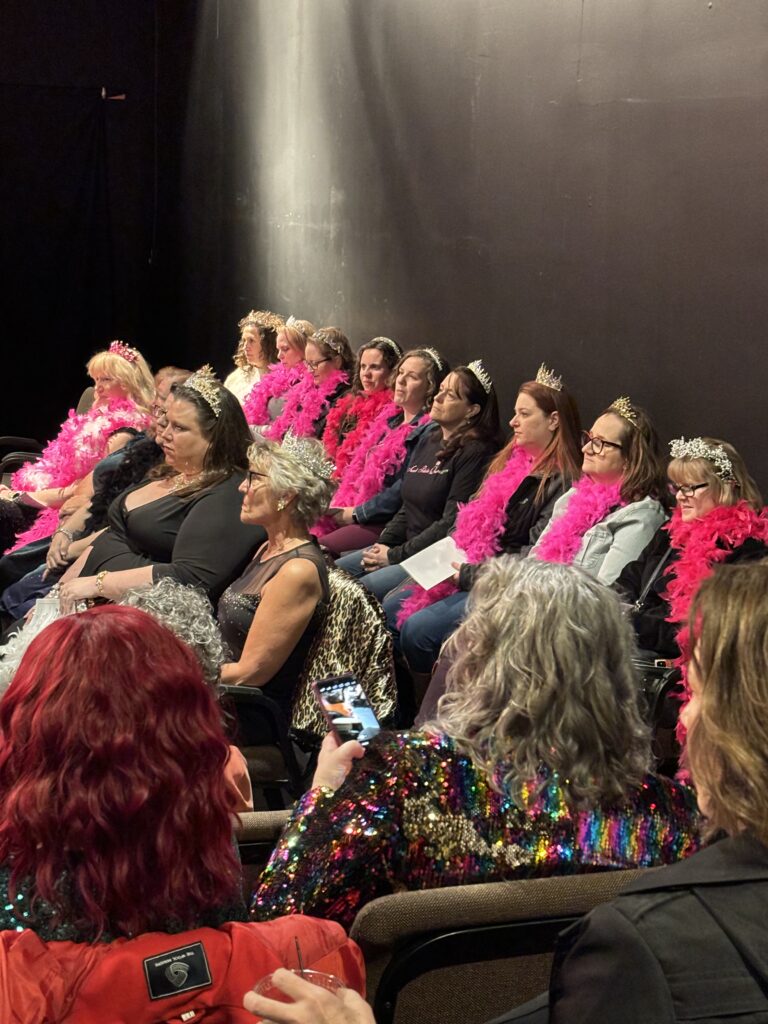

Lynn (Zipfel) Venhaus has had a continuous byline in St. Louis metro region publications since 1978. She writes features and news for Belleville News-Democrat and contributes to St. Louis magazine and other publications.
She is a Rotten Tomatoes-approved film critic, currently reviews films for Webster-Kirkwood Times and KTRS Radio, covers entertainment for PopLifeSTL.com and co-hosts podcast PopLifeSTL.com…Presents.
She is a member of Critics Choice Association, where she serves on the women’s and marketing committees; Alliance of Women Film Journalists; and on the board of the St. Louis Film Critics Association. She is a founding and board member of the St. Louis Theater Circle.
She is retired from teaching journalism/media as an adjunct college instructor.

